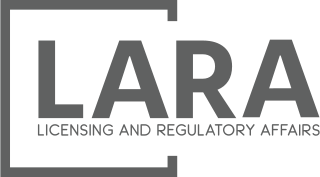Related Research Articles

The Oklahoma Employment Security Commission (OESC) is an independent agency of the state of Oklahoma responsible for providing employment services to the citizens of Oklahoma. The commission is part of a national network of employment service agencies and is funded by money from the United States Department of Labor. The commission is also responsible for administering the Workforce Investment Act of 1998 on behalf of the state.

Richard Dale Snyder is an American business executive, venture capitalist, attorney, accountant, and politician who served as the 48th governor of Michigan from 2011 to 2019.
The Michigan Department of Environment, Great Lakes, and Energy (EGLE), formerly Michigan Department of Environmental Quality, is a principal department of the U.S. state of Michigan for environmental issues. The department was created in 1995.

In California, the Employment Development Department (EDD) is a department of the state government that administers Unemployment Insurance (UI), Disability Insurance (DI), and Paid Family Leave (PFL) programs. The department also provides employment service programs and collects the state's labor market information and employment data. EDD is one of California's three major taxation agencies, alongside California Department of Tax and Fee Administration and the Franchise Tax Board. In addition to collecting unemployment insurance taxes, the department administers the reporting, collection, and enforcement of the state's personal income taxes.
The New York State Department of Labor is the department of the New York state government that enforces labor law and administers unemployment benefits.

Michigan has a republican form of government with three branches of government: the executive branch consisting of the governor of Michigan and the other independently elected constitutional officers; the legislative branch consisting of the House of Representatives and Senate; and the judicial branch consisting of the one court of justice. The state also allows direct participation of the electorate by initiative, referendum, recall, and ratification.

Michigan Department of Civil Rights is a department of the Michigan State Government created in 1965 to support the work of the Michigan Civil Rights Commission of Michigan's Constitution of 1963. The Commission directs the work of the department and has eight members. The executive director is John E. Johnson, Jr.
The Maryland Department of Labor is a government agency in the U.S. state of Maryland. It is headquartered at 1100 North Eutaw Street in Baltimore.
Iowa Workforce Development is a government agency in the American state of Iowa, responsible for overseeing workplace safety, workers' compensation, unemployment insurance and job training services. It was formed in May 1996.

The Michigan Department of Licensing and Regulatory Affairs (LARA), originally the Department of Commerce among other names, is a principal department in the Michigan executive branch that oversees employment, professional licensing, construction, and commerce.
Kevin Elsenheimer is an American judge, lawyer and politician from Republican Party and a former minority leader of the Michigan House of Representatives. He is the former Director of the Michigan Workers' Compensation Agency and deputy director and Senior Deputy Director of Michigan's Department of Licensing and Regulatory Affairs (LARA). He served in the cabinet of Michigan Governor Rick Snyder as executive director of the Michigan State Housing Development Authority (MSHDA). He was appointed 13th Circuit Court Judge by Governor Rick Snyder in January 2017.

This page relates the history of the position of Oklahoma Secretary of Commerce and Tourism.

The New Jersey Department of Labor and Workforce Development is a governmental agency of the U.S. state of New Jersey. The New Jersey Civil Service Commission is an independent body within the New Jersey state government under the auspices of the department.
The California Labor and Workforce Development Agency (LWDA) is a cabinet-level agency of the government of California. The agency coordinates workforce programs by overseeing seven major departments dealing with benefit administration, enforcement of California labor laws, appellate functions related to employee benefits, workforce development, tax collection, economic development activities. It was conceived by the 37th governor Gray Davis and was formally created by S.B. 1236 in 2002.
The Massachusetts Executive Office of Labor and Workforce Development (EOLWD) is a Cabinet level agency under the Governor of Massachusetts. EOLWD is responsible for enforcing the Commonwealth's labor laws and for providing workforce training to citizens. EOLWD is also responsible for administering Massachusetts' workers' compensation laws, enforcing laws governing collective bargaining, and for providing unemployment benefits to those in need.

Harold J. Wirths is an American Republican politician who served in the New Jersey General Assembly from 2018 to 2024, representing the 24th Legislative District. He previously served as Commissioner of the New Jersey Department of Labor and Workforce Development from May 24, 2010 to August 1, 2016, appointed by former Governor Chris Christie in 2010.
Michigan Department of Insurance and Financial Services (DIFS), formerly the Office of Financial and Insurance Regulation, is a principal department in the Michigan executive branch with responsibility for insurance and financial institutions.

The Wisconsin Department of Workforce Development (DWD) is an agency of the Wisconsin state government responsible for providing services to Wisconsin workers, employers, and job-seekers to meet Wisconsin's workforce needs. To effect its mission, the Department administers unemployment benefits and workers' compensation programs for the state of Wisconsin; ensures compliance with state laws on wages and discrimination; provides job resources, training, and employment assistance for job-seekers; and engages with employers to help them find and maintain adequate staffing for their businesses.
References
- ↑ "About". State of Michigan. 2022-05-12. Retrieved 2023-04-21.
- ↑ "Unemployment Insurance Agency". State of Michigan. 2022-05-12. Retrieved 2023-04-21.
- ↑ Pluta, Rick (December 18, 2014). "Gov. Snyder to create "Department of Talent and Economic Development"". Michigan Radio. Retrieved March 26, 2015.
- 1 2 3 Lawler, Emily (December 18, 2014). "Michigan Gov. Rick Snyder debuts new workforce talent department with executive order". Mlive. Mlive Media Group. Retrieved March 26, 2015.
- 1 2 Lawler, Emily (March 16, 2015). "New state of Michigan department officially formed, will focus on talent". Mlive. Mlive Media Group. Retrieved March 26, 2015.
- 1 2 3 Lawler, Emily (June 6, 2019). "Gov. Whitmer creates new Department of Labor and Economic Opportunity". Flint Journal. Mlive Media Group. Retrieved September 25, 2019.
- 1 2 Livengood, Chad (June 6, 2019). "From TED to LEO: Whitmer reorganizes workforce, economic development department". Crain's Detroit Business. Crain Communications. Retrieved September 25, 2019.